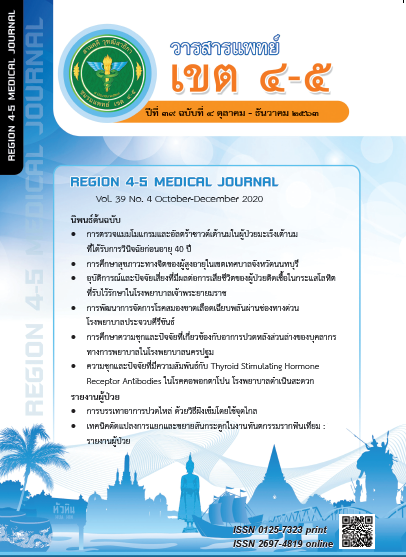การศึกษาสุขภาวะทางจิตของผู้สูงอายุในเขตเทศบาลจังหวัดนนทบุรี
คำสำคัญ:
สุขภาวะทางจิต, ผู้สูงอายุบทคัดย่อ
บทคัดย่อ
วัตถุประสงค์: เพื่อศึกษาระดับสุขภาวะทางจิตของผู้สูงอายุ และเปรียบเทียบสุขภาวะทางจิตของผู้สูงอายุในเขตเทศบาลจังหวัดนนทบุรีตามปัจจัยคัดสรร
วิธีการศึกษา: การศึกษาเชิงพรรณนาในผู้สูงอายุที่อาศัยในเขตเทศบาล จังหวัดนนทบุรี กลุ่มตัวอย่างเป็นผู้สูงอายุในเขตเทศบาลนคร เทศบาลบาลเมือง และเทศบาลตำบลของจังหวัดนนทบุรี จำนวน 17 แห่ง ได้จากการสุ่มแบบหลายขั้นตอน จำนวน 405 คน เครื่องมือที่ใช้เป็นแบบสอบถามสุขภาวะทางจิตของผู้สูงอายุ ที่ผู้วิจัยพัฒนาตามแนวคิดของ Ryff and Keyes ตรวจสอบความตรงตามเนื้อหาโดยผู้ทรงคุณวุฒิจำนวน 7 คนคัดเลือกข้อคำถามที่มีดัชนีความสอดคล้องมากกว่า .50 และวิเคราะห์ค่าความเชื่อมั่นด้วยสัมประสิทธิ์แอลฟาของครอนบาค ได้เท่ากับ .91 สถิติที่ใช้ในการวิเคราะห์คือร้อยละ ค่าเฉลี่ย ส่วนเบี่ยงเบนมาตรฐาน และ เปรียบเทียบคะแนนเฉลี่ยระหว่างกลุ่มโดยใช้สถิติ Independent samples t-test
ผลการศึกษา: ผลการวิจัยพบว่าสุขภาวะทางจิตของผู้สูงอายุโดยรวมอยู่ในระดับดี โดยมีค่าเฉลี่ย ( = 4.18 SD =0.70) เมื่อพิจารณารายด้านพบว่าสุขภาวะทางจิตด้านการมีสัมพันธ์ภาพกับผู้อื่น และด้านความเป็นตัวของตัวเองอยู่ในระดับดีมาก และมีค่าเฉลี่ยสูงสุด (
=4.41 SD =0.63) และ (
=4.24 SD =0.67)ตามลำดับ ทั้งนี้ยังพบว่าสุขภาวะทางจิตของผู้สูงอายุแตกต่างกันอย่างมีนัยสำคัญทางสถิติตามปัจจัยที่คัดสรร ได้แก่ 1) ความพอเพียงของรายได้ 2) การเป็นสมาชิกชมรมผู้สูงอายุ
สรุป: สุขภาวะทางจิตของผู้สูงอายุโดยรวมอยู่ในระดับดี ร่วมกับการมีรายได้พอเพียงและการเข้าร่วมกิจกรรมของชมรมผู้สูงอายุมีแนวโน้มที่จะทำให้สุขภาวะทางจิตของผู้สูงอายุดีขึ้น ดังนั้นจึงควรสนับสนุนให้ผู้สูงอายุเข้าร่วมกิจกรรมของชมรมรวมถึงการจัดกิจกรรมที่จะส่งเสริมรายได้ให้ผู้สูงอายุตามความเหมาะสม
เอกสารอ้างอิง
1. Foundation of Thai Gerontology Research and Development institute (TGRI). Situation of Thai Elderly 2017. Bangkok: Foundation of Thai Gerontology Research and Development Institute; 2018.
2. Malee S. Know the aging society and the situation of the elderly (In Thailand). OCSC e-JOURNAL 2018;60(4):5-8.(in Thai).
3. Subprawong K. Psychological well-being of the Thai elderly. BU Academic Review. 2012; 11(2): 99-110.
4. National Statistical Office. Preliminary report of the 2014 survey of the elderly population in Thailand. Bangkok: Population Statistics Group Bureau of Social Statistics National Statistical Office; 2014.
5. Nonthaburi Province. Development plan Nonthaburi 5-year (2018-2022):The annual review of the budget year. Nonthaburi:Strategy and Information Development Group Nonthaburi;2020. (in Thai).
6. Prapakornsirithamma P. The Health of the Elderly in Tha It Community Wat SangsiritumNontaburi. [Master thesis].Phra Nakhon Si Ayutthaya: Mahachulalongkornrajavidyalaya University.2017.(in Thai).
7. World Health Organization. Active Ageing: A Policy Framework. Geneva: World Health Organization; 2002.
8. National Statistical Office. Active Ageing Index of Thai Elderly [Internet]. 2018 [cited 2020 Apr 10]. Available from : http://www.nso.go.th/sites/2014/DocLib13/A2/ActiveAgeingIndex.pdf.
9. Paúl C, Ribeiro O, Teixeira L. Active Ageing: An empirical approach to the WHO model. Curr Gerontol Geriatr Res. 2012; 2012: 382972. doi: 10.1155/2012/382972.
10. Gray R. Active Ageing Index in Thailand: experience with statistical tools to measure demographic trends and policy outcomes related to demographic developments [Internet]. 2019 [cited 2020 Mar 1]. Available from: https://www.unescap.org/sites/default/files/Building%20a%20new%20index%20to%20measure%20active%20ageing.pdf.
11. UNECE/European Commission. Active Ageing Index project [Internet]. 2019 [cited 2020 Mar 15]. Available from: https://statswiki.unece.org/display/AAI/Active+Ageing+Index+Home.
12. Zaidi A, Katrin G, Zolyomi E, et al. Measuring active and healthy ageing in Europe. Journal of European Social Policy. 2017; 27(2), 138-157. doi: 10.1177/0958928716676550.
13. Saengprachaksakula S. The determinants of Thai Active Ageing Level. JSSH. 2015; 21(1): 139-67.
14. National Statistical Office. Preliminary Report of the 2014 Thai Elderly Population Survey. Bangkok: Population Statistics Group, Bureau of Social Statistics, National Statistical Office; 2014.
15. Ryff CD, Keyes CLM. The structure of psychological well-being revisited. Journal of Personality and Social Psychology. 1995; 69(4): 719-27. doi: 10.1037//0022-3514.69.4.719.
16. Kaemkate W. Research Methodology in Behavioral Science. Bangkok,Faculty of Education.Chulalongkorn University; 2012.
17. Chaisang U, Chaisang N, Marano L. Psychological well-being and perspectives on mental health promoting lifestyle among elderly in the center for quality of life development, Yala City Municipality, Yala Province. SCNJ. 2020; 7(1): 306-18.
18. Maslow AH. A theory of human motivation. Psychological Review. 1943; 50: 370–96.
19. Subprawong K. Five-factor personality and psychologycal well-being of Thai people. TH J CLI PSY. 2010; 41(1): 31-42.
20. Boonyanuwat J, Pranee C, Vithayachockitikhun N. Development of learning management program to promote psychological well-being of the elderly in Chainat Province. Social Sciences Research and Academic Journal. 2013, 8(24); 89-106.
21. Ryff CD. Psychological well-being revisited: advances in the science and practice of eudaimonia. Psychother Psychosom. 2014; 83(1): 10-28. doi: 10.1159/000353263.
22. Ministry of Public Health. Strategic plan: Ministry of Public Health 2017–2021. Nonthaburi, Office of Policy and Strategy Office of the Permanent Secretary;2017.(in Thai).
ดาวน์โหลด
เผยแพร่แล้ว
รูปแบบการอ้างอิง
ฉบับ
ประเภทบทความ
สัญญาอนุญาต
ลิขสิทธิ์บทความเป็นของผู้เขียนบทความ แต่หากผลงานของท่านได้รับการพิจารณาตีพิมพ์ลงวารสารแพทย์เขต 4-5 จะคงไว้ซึ่งสิทธิ์ในการตีพิมพ์ครั้งแรกด้วยเหตุที่บทความจะปรากฎในวารสารที่เข้าถึงได้ จึงอนุญาตให้นำบทความในวารสารไปใช้ประโยชน์ได้ในเชิงวิชาการโดยจำเป็นต้องมีการอ้างอิงถึงชื่อวารสารอย่างถูกต้อง แต่ไม่อนุญาตให้นำไปใช้ในเชิงพาณิชย์




